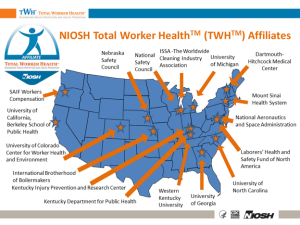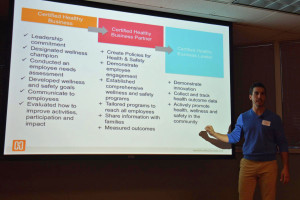DENVER, Colo. — In contrast to the majority of worksite wellness programs, which generally only focus on a single dimension of employee welfare, Colorado-based Health Links takes a broad approach that encompasses employee health, wellness, and safety.
“What we do,” explained Joshua Scott, a researcher at the Colorado School of Public Health, “is we advise, we certify, and we connect businesses to help them improve the health, safety, and wellbeing of their employees, their families, and their communities.”
A nonprofit initiative led by health and safety experts at the Colorado School of Public Health’s Center for Health, Work, and Environment, Health Links simplifies worksite wellness, making it affordable for startups and small businesses throughout the state.
Wellness Programs for Small Businesses

The Center for Health, Work, and Environment is recognized by the CDC as one of its Total Worker Health affiliates.
As Scott describes it, Health Links doesn’t offer businesses a set wellness program. Instead, its team members serve as consultants, helping individual companies create wellness frameworks that address their unique health and safety issues.
These wellness frameworks are informed in part by the CDC’s Total Worker Health Program, which strives to ensure that businesses integrate “occupational safety and health protection with health promotion to prevent worker injury and illness and to advance worker health and well-being.”
According to Scott, establishing a wellness framework with Health Links is well within the reach of Colorado’s small business community.
“Most of the wellness efforts that are out there are focused on large businesses and organizations,” Scott said. “Our main focus is small businesses. We define that as less than five hundred employees, but I can tell you that the majority of businesses that we work with are less than a hundred. And in fact it’s really one to fifty.”
Scott also explained that because the cost of implementing a program can be prohibitive for startups, Health Links provides seed funding of up to a thousand dollars to qualifying businesses “to help them get off the ground and running.”
After acknowledging that wellness might seem like a peripheral concern for recently launched companies, Scott expressed his conviction that the sooner a startup implements a wellness program, the quicker it will see an impact on its bottom line.
“We did a study with Pinnacol Assurance, which is the main Workman’s Comp provider in Colorado. What we found is that if a wellness program is employer-driven, meaning that it focuses on the needs of the employer and the interests of the employees, there is up to a two-to-three dollar return on investment.”
Worksite Wellness with Community Impact

Scott describes the Health Links business certification process during a recent Prime Health meetup.
“Forty percent of Americans say that work is often or always stressful,” Scott said as he introduced the impact that worksite wellness programs can have on communities. “This is a problem for a variety of reasons. For one, do you think that stress stays at work? No, absolutely not. It comes home and it affects the families of employees.”
According to Scott, Health Links ensures that the benefits of its wellness frameworks spill over into communities through its business certification program.
“We have three levels by which we certify businesses,” Scott explained. “We have a certified level, a partner level, and a leader level.”
As businesses move through these levels, they are required to share wellness information with the families of employees and promote healthy activities within their employees’ communities.
To complement these business-led community initiatives, Health Links encourages community members to play a role in worksite wellness by training community-based advisors. “They reach out to businesses or can be filtered through Health Links to work with businesses within the framework that we’ve developed for worksite wellness.”
And as a final means of strengthening the relationship between businesses and the communities in which they operate, during its consultations, Health Links helps companies gain access to community resources for their worksite wellness programs.
“If somebody needs mental health coaching or an organization needs webinars on stress management, Health Links doesn’t directly provide that. We connect businesses with community resources that can provide that for them.”
A Culture of Health, Wellness, & Safety
“In the startup community that we work with,” Scott explained, “the mission of health, wellness, and safety does not have to take precedence only when you are successful. The businesses that are truly successful have built this in from the very beginning and made it a part of their culture.”
Like the coverage that CyberMed News provides? Follow us on Twitter, LinkedIn, and Facebook to make sure you keep up to date on the most recent developments in digital health.





Be the first to comment on "Health Links Helps Startups Deliver Worksite Wellness with Community Impact"